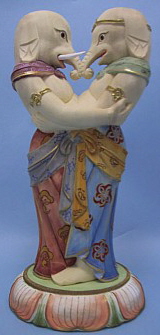As much as I like to discover the esoteric meaning of Hindu Gods and Goddesses, I am equally fascinated by their history. Where they came from, how they evolved and their place in the world in present times. In my previous posts I have often touched upon other forms of the deities, as they are worshipped today, in other countries or religions.
This is a historical phenomenon, which entertains and fascinates me to no end. Buddhism had a huge impact on all East Asian cultures, especially on their pantheons of deities. On first glance it might seem odd that a reform movement, which rejected many of the core tenets of Vedic religion would transmit a belief in Vedic deities. This apparent oddity is a misunderstanding of Buddhism’s “atheism,” and a misunderstanding of what a “Deva” actually is.
Most forms of Buddhism, while rejecting the concept of all-powerful gods or creator deities, openly accept the existence of powerful supernatural beings.
In the Buddhist pantheon, the Devas have generally converted to Buddhism and now serve as his protectors, the protectors of his teachings, or as helpers to mortals who are trying to achieve enlightenment.
To find out more on how the Buddhist versions of Hindu gods were integrated into Japanese culture ( with fantastic images) read the rest of the article here Hindu Devas Take a ( Silk Road) Trip to Japan!






